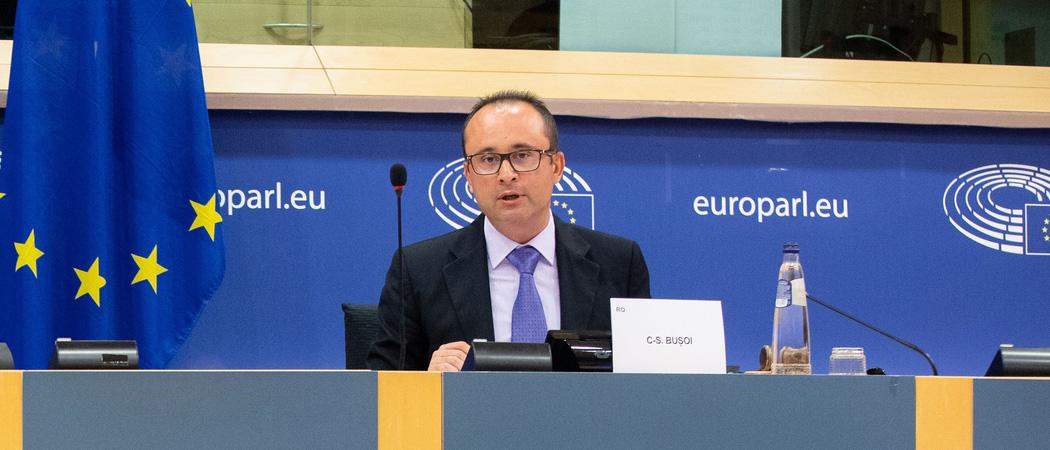Average public investment in research in the EU is 0.81% of GDP. The European Parliament remains unimpressed by national efforts

Cristian Busoi, European Deputy. Photo : European Union
Efforts by EU countries to improve their research systems are showing uneven progress and the speed of reforms is slowing down, MEPs warned during a plenary debate on Wednesday.
The European Parliament says member states should raise public expenditure on research and development from 0.81% to 1.25% of GDP by 2030, to help the EU achieve targets set by the European Commission’s plan to establish a single market for research in the European Research Area (ERA).
“We are concerned that improving the quality of research and innovation system is slowing down and shows uneven progress across the Union,” said Cristian Bușoi, the chair of the Parliament’s industry and research committee, ITRE.
EU commissioner for research and innovation Mariya Gabriel is drafting a pact for research and innovation that all member states are expected to sign, committing them to raising R&D investments. Two decades ago, the EU said member states should aim to boost public and private R&D expenditure to 3% of their GDP, but so far only three countries have reached the target.
The new pact reinstates the 3% target, but it also includes commitments to reform national research systems, improve career opportunities for researchers, and increase national public R&D funding of joint EU programmes and partnerships from its current level of just below 1% to 5%.
Since 2010, investment in R&D has gone up 1.3% across the EU, but the bloc is still lacking €110 billion short of reaching the 3% of GDP target. “From the member states we need greater investment in science and creation of true ecosystems that are borderless,” said MEP Maria Leitão Marques.
“We must continue to invest in science and innovation and pay particular attention to fundamental research, both at the commission level and at the member state level,” said Portuguese MEP Maria da Graça Carvalho.
“The differences between the research budgets of member states need to be reduced,” said Latvian MEP Ivars Ijabs.
It is the first time MEPs have debated the upgrade of the European Research Area in a plenary session since the plan was published by the Commission in September. The debate had been postponed because of a lack of official endorsements from all political groups.
On Wednesday, commissioner Gabriel travelled to Bulgaria to attend the Three Seas Initiative summit and was not able to attend the Parliament session. EU environment commissioner Virginijus Sinkevičius defended the ERA plan in the plenary.
“The Commission engages in in-depth policy dialogues with member states with the aim of supporting structural reforms and fostering investments,” Sinkevičius said of stagnating R&D investments in poorer member states.
Research and innovation gap
Last month, the Commission published its innovation scoreboard, the league table comparing R&D performance in all EU member states and regions. This shows several countries in southern and eastern Europe have improved their R&D performance, but excellence in research and innovation remains concentrated in northern and western Europe.
Member states that joined the EU after 2007 had poor results in EU research competitions under Horizon 2020, but the Commission hopes the new ERA strategy and additional funds for the widening programme in Horizon Europe help researchers in those countries win more prestigious EU grants and compete on a more equal footing with counterparts in richer regions.
However, the research and innovation gap persists, mainly because many member states do not invest enough money in national projects and do not take full advantage of EU regional funds and the newly established pandemic recovery and resilience fund. “One of the keys to success of significant currently increased public spending on research and innovation lies in integrating different European national and private funding streams,” said Bușoi.
MEPs have asked the Commission and member states to come up with better plans for reducing the precariousness of research careers and increase the quality of science produced. “There is a clear need for a more targeted support aimed at helping close the research and innovation gap in the union,” said Bușoi.
Sinkevičius said Europe needs appropriate R&D investments in all member states for the bloc to be able to secure competitive leadership in the global race for developing new technologies in quantum computing and climate. “Europe needs to bridge the research and innovation divide,” he said.
Editor’s note: This article has been updated 9 July. The Commission wanted to specify that, on the day of the plenary, commissioner Gabriel travelled to Bulgaria to attend the Three Seas Initiative summit.





 A unique international forum for public research organisations and companies to connect their external engagement with strategic interests around their R&D system.
A unique international forum for public research organisations and companies to connect their external engagement with strategic interests around their R&D system.